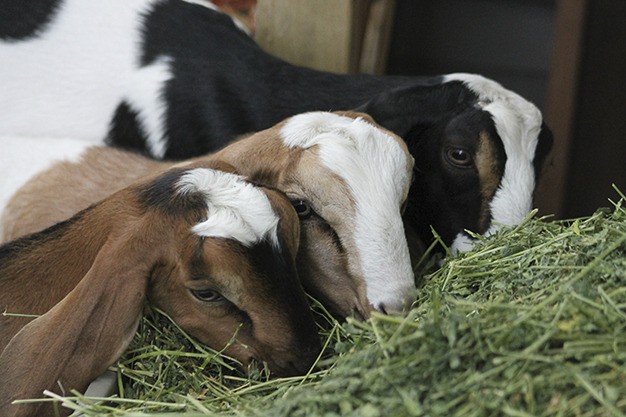It’s not uncommon for the Mercer Island School District to enlist seasonal help for its summer projects. But this year, the district got creative in dealing with a tedious, pervasive issue that presented difficulties for regular maintenance workers.
MISD purchased three four-month-old Nubian goats, affectionately named Larry, Curly and Moe, to chomp their way through blackberry bushes and other brush in various greenbelt areas that need clearing throughout school grounds.
The goats begin work everyday at 7 a.m. and clear as much brush as their voracious appetites will allow. They officially began “work” in the high school’s stadium last week, grazing around the fenced scoreboard area. Maintenance and operations director Tony Kuhn said he uses a grain bucket to lead them into the overgrown areas.
“It’s amazing to watch them go through this,” he said. “I don’t know how else to describe it; they’re like locusts. They’ll seek out blackberries first and from there, they’ll take their favorite food and go through the whole area. Then they come back and work on the ivy.”
Kuhn said using the goats was intended to serve more as a green effort than a cost-saving move, though he mentioned purchasing goats, instead of renting, proved to be a friendlier financial option. Kuhn estimated a total investment of $500, including creating a shelter out of reclaimed wood from the teardown of the North Mercer gym.
Now instead of having maintenance workers run chainsaws in tight areas, Larry, Curly and Moe take their appetites to clear whatever pesky bushes stand in their way.
“There are certain areas around the stadium that are nearly impossible to access. These little guys blaze their trail and make it happen,” Kuhn said. “It’s a lot of fun. People will stop on the road and ask questions. They’ve been received very well. They’re fairly quiet, neighbors are excited about them and haven’t heard them.”
Because the areas the goats are clearing are unoccupied, non-public areas, Kuhn says most of the waste left behind basically serves as fertilizer, as their waste is safe to compost. Though Kuhn does dissuade neighbors and passerby from feeding the goats any extra food or treats.
When the goats finish their work clearing the stadium, they will make their way through some of the district’s stormwater detention areas and other areas overgrown with blackberry and condensed brush.
Kuhn said the goats will likely work into the fall. After that, a district employee who has a farm in Fall City will likely house the goats through the winter, until their services will be needed again next spring.
And the need is certainly there. With several goat landscaping businesses springing up around the region, Kuhn says this method appears to be the way to go.
“It’s really been an inexpensive way of clearing,” he said. “I think we already may be money ahead.”


